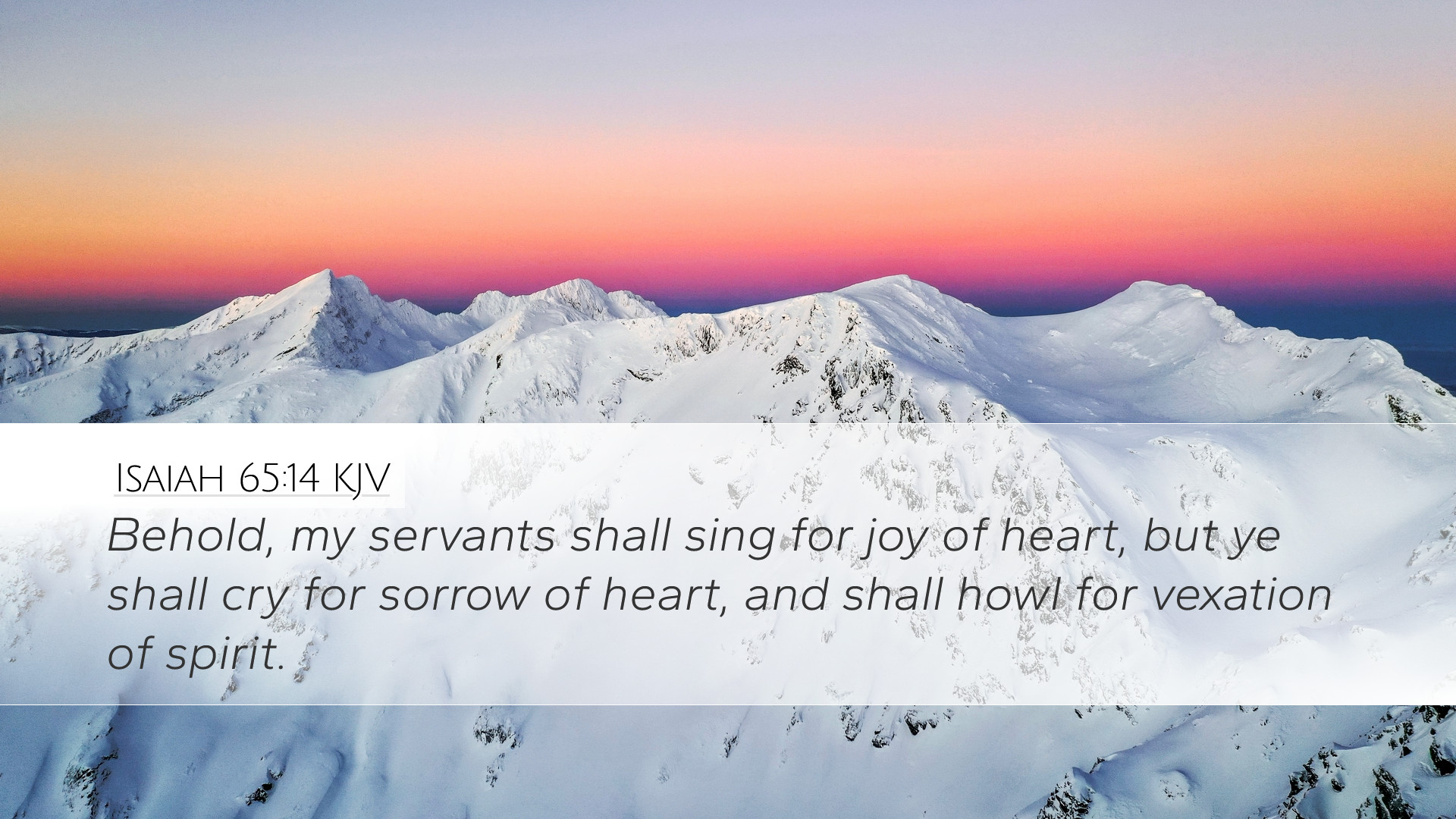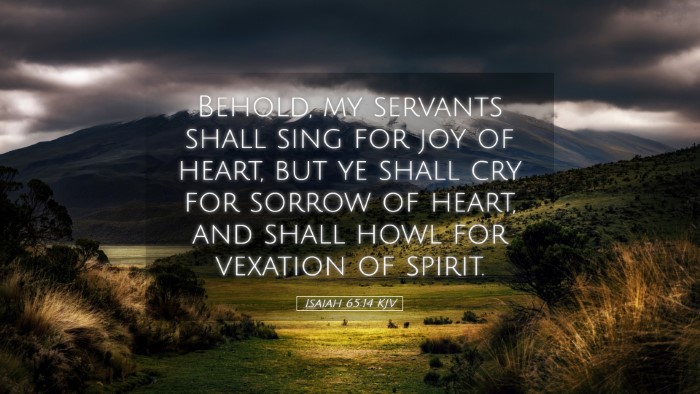Isaiah 65:14 Commentary
Verse Context: Isaiah 65:14 states, "Behold, my servants shall sing for joy of heart, but ye shall cry for sorrow of heart, and shall howl for vexation of spirit." This verse contrasts the fate of God’s servants with that of those who reject Him, illustrating the deep divide between the faithful and the unbelieving.
General Overview
Isaiah 65 serves as a powerful conclusion to the Book of Isaiah, encapsulating themes of judgment, promise, and hope. In this chapter, God addresses the remnant of Israel—His faithful servants—who will experience joy in contrast to those who have turned away from Him. This particular verse strikingly emphasizes the emotional and spiritual states of both groups.
Insights from Commentators
Matthew Henry's Commentary
Matthew Henry reflects on the stark imagery in this verse, highlighting the joy of God’s servants as a divine compensation for their suffering and trials. Henry notes that singing "for joy of heart" implies a jubilant return to the true experience of worship, recognizing their secure position under God's grace. He contrasts this with the lament of the wicked, whose sorrow arises from realizing the futility of their rebellion.
- Divine Assurance: The promise of joy indicates God's assurance to His people that their faithfulness will be rewarded despite their current trials.
- Emotional Responses: The sorrow of the wicked showcases how their rejection of God results in an emptiness of spirit—a necessary consequence of their choices.
Albert Barnes' Notes on the Bible
Albert Barnes provides a detailed analysis of the implications behind these contrasting outcomes. He indicates that the "sorrow of heart" for the unfaithful is not merely emotional but also existential, deriving from a separation from God and resulting in an overwhelming sense of loss and regret. Barnes elaborates on the phrase "howl for vexation of spirit" as an indication of the spiritual torment that comes from being distanced from divine grace.
- Prophetic Warning: Barnes underscores that this prophecy serves as a warning to the people of Israel, calling them to recognize the dire consequences of turning away from God.
- Hope Amid Tribulation: Barnes also reassures that for those who remain faithful, there is hope and a future filled with joy and fulfillment.
Adam Clarke's Commentary
Adam Clarke's insights further elucidate the emotional depth of this passage. He interprets the “joy of heart” as indicative of a blessed state in which believers experience the fullness of life and peace in communion with God. Clarke points out that the use of "my servants" signifies a close relationship between God and His people, asserting that their devotion will not go unnoticed. In stark contrast, Clarke notes that the “howling” of the wicked is emblematic of their anguished realization of the consequences of their choices, leading to a profound sense of despair.
- God’s Favor: Clarke emphasizes that the joy of the faithful reflects not only their individual state but also God’s favor and redemptive purpose for them.
- Spiritual Warfare: He discusses the notion of spiritual warfare inherent in the emotions illustrated in this verse, emphasizing the conflict between the faithful and the unfaithful.
Theological Implications
This verse prompts significant theological reflections that are vital for pastors, theologians, and Bible students. The binary experience of joy versus sorrow posed in Isaiah 65:14 serves to echo the New Testament truths of the cost of discipleship and the ultimate reward of eternal life versus eternal separation from God.
Contrast Between Joy and Sorrow
The contrast drawn between the joy of God’s servants and the sorrow of the unfaithful reveals essential truths about human experience. This dichotomy can be analyzed through various lenses:
- Eschatological Hope: The faithful are assured of their future hope, which is ultimately fulfilled in Jesus Christ. The joy described can be seen as a foretaste of the eternal joy secured through Christ's redemptive work.
- Moral Choice: The responses of joy versus sorrow emphasize the moral responsibilities of the individuals. Each person’s choice impacts their eternal standing and experience.
- Community Implications: The social implications can lead to discussions on communal worship and shared experiences of sorrow and joy within the church. Pastors can explore how the church community rallies around those who sorrow, providing support while celebrating the joys of faithful living.
Practical Applications
For contemporary application in church settings, this verse invites deep reflection on the emotional landscape of believers today. Here are several areas to consider:
- Encouragement in Trials: Pastors can use this verse to encourage congregants enduring hardship, emphasizing the promise of joy for those loyal to God.
- Evangelistic Urgency: The realities depicted can inspire urgency in evangelism, prompting outreach efforts to those who may be in a state of spiritual despair.
- Personal Reflection: Believers are encouraged to evaluate their own lives concerning the joy of heart described. This reflection could lead to repentance or recommitment to God.
Conclusion
The rich commentary provided on Isaiah 65:14 by respected theologians underscores the depth of God's care for His people and the grave reality awaiting those who reject Him. The emotional contrasts serve as a poignant reminder of the choices faced by humanity. For pastors, students, theologians, and scholars, the verse serves as both a warning and a promise—a call to remain steadfast in faith and pursue a life characterized by the joy of knowing God.


